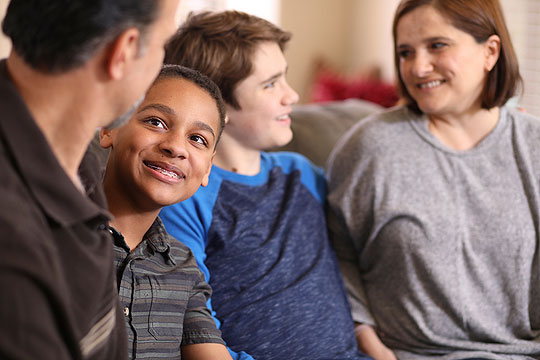How to Talk to Your Kids About Fostering
August 6, 2018

One of the most common questions we get about becoming a foster parent is: "How will this impact my own children and how do I explain this to them?"
It’s very common for foster parents to also have children of their own. And with 60 years of experience as a leading foster care provider in Massachusetts, HopeWell can help you think about how to navigate this important question.
- Speak to them in age-appropriate language. Talking to a toddler is very different than talking to a teenager. For example, a young child may ask where the foster child’s mommy and daddy are and why they can’t live with them. Saying something like, “Their mommy and daddy are doing some classes so they can take good care of them and ___ will live with us for a little while until they are done,” can be helpful in explaining the situation. With older kids, you can be more direct, but still be careful not to share information that would breach the foster child’s confidentiality.
- Assure them that you love them. It’s quite common, especially for younger kids, to feel some anxiety about a new child coming into the home. They might worry that they will lose their place and subsequent attention from you. Let them know that they are special and will always be loved, no matter who comes into your home.
- Let your child know they can be a leader and demonstrate good behavior. Different families have different norms, whether fostering or not. For example, a child experiencing foster care may have experienced a late bedtime or no bedtime at all. They may swear. They could lie. It’s important to anticipate that their behavior may not be exactly what you are used to from your own child, and your child will notice. Let them know their example can be really helpful.
- Be fair. Kids (and people in general) are concerned with fairness, especially at home. Talk with your child about how although fair doesn’t always mean everybody gets the exact same thing, you will have the same rules and chores for them and the child entering your home.
- Teach your child to take it slow. Kids will often be very excited at the prospect of having a new child in the home, and may pepper them with questions or try to involve them in everything they do. This can be overwhelming for children in foster care, so make sure they still get their space and know that it can take time for them to feel comfortable.
- Ask them if they have any concerns. The decision to become a foster parent is one that needs to be endorsed by everyone in the family, including your kid(s). Give your children a voice and allow them to share anything they may be worried about. Let them know their perspective is important and that you wouldn’t do anything that they are really opposed to.
Becoming a foster parent is a journey and you can expect bumps along the way. However, many families who have opened their door children in need of a safe place to grow and thrive will tell you that it was the greatest decision they ever made, not just for them but for their own kids as well.